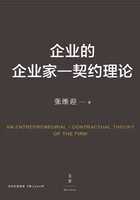
第3章 ABSTRACT(2)
Under the assumption that personal assets WO are costlessly observable for all individuals while marketing ability θ is private information(or observable only at some cost), we will demonstrate that capitalists with high marketing ability will be the winners of the competition for being the entrepreneurs because their costlessly observable capital stocks can work as a device to signal information about marketing ability of the would-be entrepreneur, and the arrangement therefore saves transaction costs. In other words, when information of ability is asymmetric between the insider and outsiders, only those would-be entrepreneurs who possess enough personal assets can be trusted as qualified entrepreneurs. Capitalists are more likely to be honest, credible, responsible and industrious when they choose to be entrepreneurs. They have less incentive to overstate their entrepreneurial ability, or to overinvest. A capitalist can earn“pure”profit, because his capital economizes on transaction costs by signaling information. In short, we show that capital-hiring-labour is a mechanism which guarantees that only qualified people will be chosen to be entrepreneurs(/managers); in contrast, if labour hires capital, the market for entrepreneurs(/managers)would be full of lemons(i. e. , too many unqualified people would choose to do marketing).
Finally, we set up a general equilibrium entrepreneurial model of the firm, in which marketing ability θ, personal assets WO and risk-attitudes R are identified as the three key factors determining the choices of being an entrepreneur or a worker or a manager or a pure capitalist. We will show that there is a general equilibrium in which all individuals have their(constrained)optimal choices and different forms of the firm are chosen so that both the labour market and the capital market stay in equilibrium(goods market equilibrium can be understood as a by-product of labour market equilibrium and capital market equilibrium). In particular, we will show that the equilibrium relationships(both in pecuniary and non-pecuniary terms)between the firms’members depends on the joint distribution of marketing ability, personal wealth and risk attitudes in the population. Given asymmetry of distribution of entrepreneurial ability and distribution of personal wealth, the joint-stock company as a cooperation between capital and ability occurs if the costs of searching for high ability people are not prohibitively high. And it is also socially optimal to allow capitalists to select the management because the more personal assets a person holds, the more incentives he has in searching for high ability people. We argue that the major function of shareholders is to select a high ability manager rather than to monitor an incumbent manager.
The basic ideas of this thesis can be described by using a two-way classification of individuals(we omit the risk-attitude dimension).